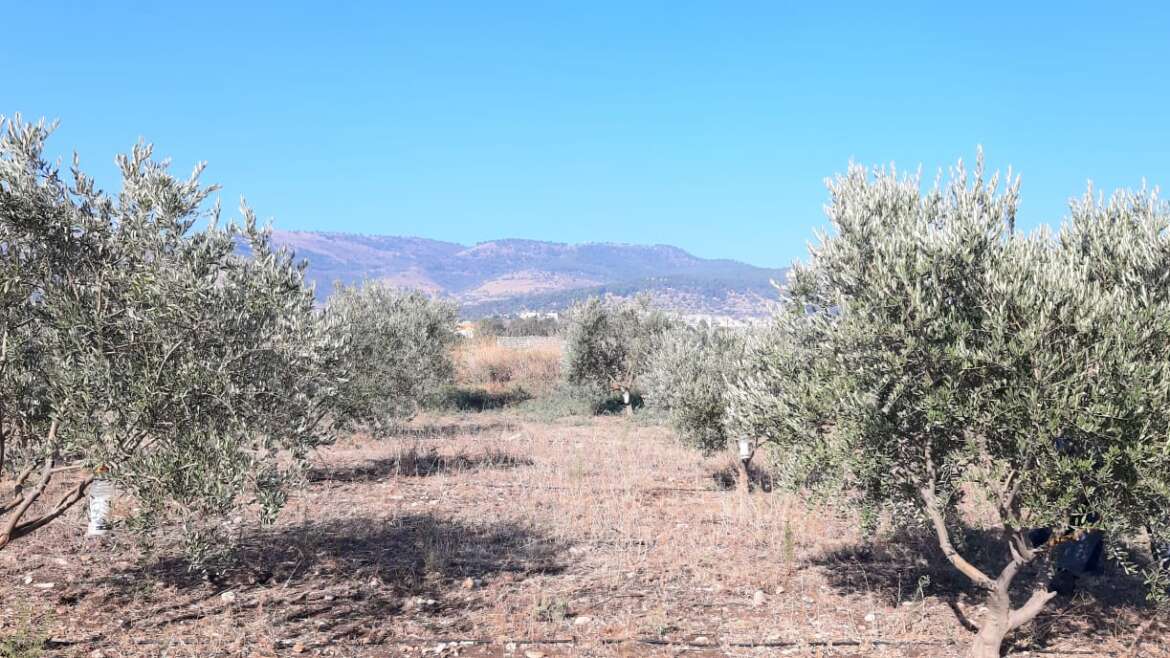In 2020, Shir Hadash launched a new initiative: The Jonathan Pear Educational Farm, also known as PE’AH (P-ositive E-ducation though A-griculture in our H-omeland) Program. Located in the north of Israel – just outside of Rosh Pina – this farm is dedicated to not only having our members cultivate the land, but also sharing this experience with others — such as Israeli youth volunteers and overseas’ visitors. In so doing, the farm connects people in a very real way to the land of Israel, reclaims the Jewish awareness of our agricultural roots, and educates about the values and ethics contained within the Torah’s agricultural-related commandments — such as food justice, Jewish environmentalism, the ability to transform the physical into the spiritual.
If you represent a local educational institute or visiting group and would like to arrange for participants to volunteer on the farm, we would love to hear from you.
*****************
The farm itself is dedicated to perpetuating the memory of Jonathan Aaron Pear, יהודה אהרון בן משה ובתיה, z”l (may his memory be for a blessing). Although a realtor and businessman by profession, Jonathan enjoyed hard physical labor as well, and seeing people engage in – and produce tangible results as a consequence of – such work would give him great pleasure.
For those interested in learning more about Jonathan, please find below the eulogy delivered by our Rabbi – and Jonathan’s brother – on his passing:
It is said that parents have ru’ach hakodesh (a form of prophecy) when they name their children, that the names they give somehow reflect key elements of that person’s character. The Midrash also notes that ever person has 3 names: “one that he is called by his father and mother; one that people know him by, and one that he acquires for himself.” My brother Jonathan had three names given him by my parents – Jonathan, of course; his middle name Aaron; and his Hebrew name Yehuda – and I’d like to suggest they all add something to our understanding of who this most special person was, as they all were not just names, but also qualities Jonathan fulfilled.
Jonathan, of course, was the most familiar … and God forbid you called him John, Jonny or any other derivative short of Jonathan. My mother trained us siblings to answer the phone a certain way when we were young, and if and when a friend of Jonathan’s called and asked to speak to John, we were instructed to inform the caller that no one by that name lived at this number and simply hang up.
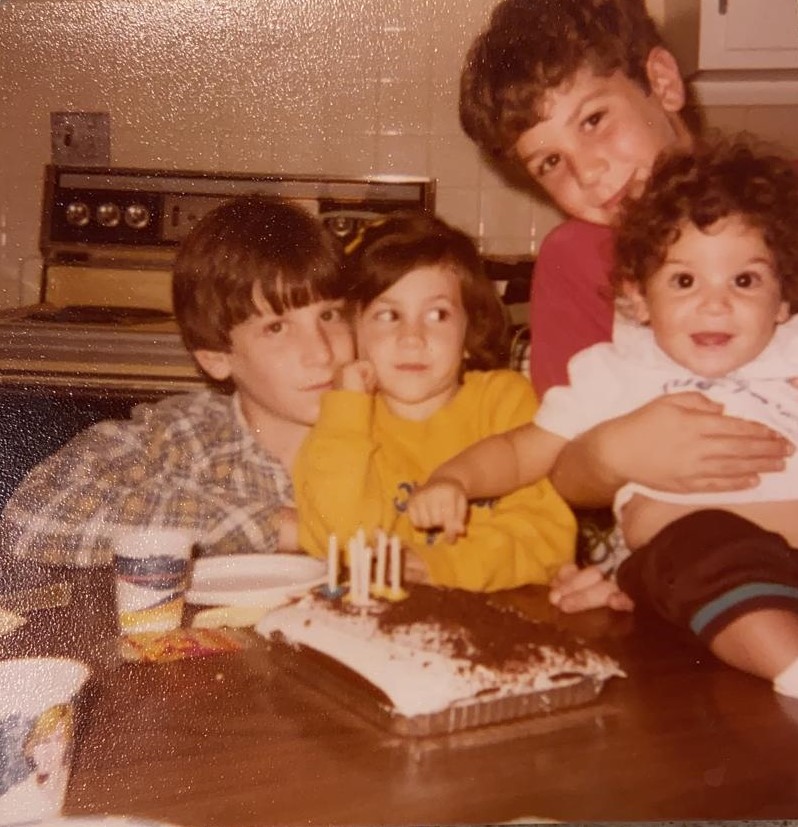
When I think of the name Jonathan I think of two books. The first was a book we had growing up. I’m not sure if my parents bought it, or if someone with a sense of humor gave it to our family as a gift. It was called That Pest Jonathan. As a 2nd born I loved that book, and thought its author should win a nobel prize for accuracy in literature; right there in black and white – in the title of the book itself – was confirmation that my older brother was a pain in the neck. (Oddly enough, I think Jonathan liked that book, too, taking some pride in the mere fact there was a book all about him … or at least his name).Over these past few months of my brother’s sickness, I’ve recollected a lot with Jonathan and together we recalled lots of stories from our childhood. To my chagrin, as I’ve engaged in this process, I have come to the realization that I was the pest in most of these stories. Like many brothers close in age, we fought a lot … and I lost a lot. Two things I’ve realized recently. First, despite these fights, we never really had a fight. Shortly after he beat me up, we would eat together dinner, go outside and play ping-pong or basketball together, ride our bikes or do some other fun activity. My Mom probably did not like all the rough housing and destruction of property in the house, but it didn’t seem to diminish our relationship too significantly.
The second thing I realized is that while the fight usually involved Jonathan finishing it, more often than not it was me who somehow started it. I was the pest. For most of my life I always assumed Jonathan beat me up for no reason, but in walking down memory lane – and widening the lens a little – I’ve realized the opposite was the case. For example, I once won best dressed in middle school – despite the fact anyone who knows me knows I should never win such an award. The reason why I had is thanks to Jonathan. He worked hard during high school in a department store after school, and spent a lot of his money (along with his employee discount at that same store) buying some great clothes. Since he left for school earlier than me I was able to go in his closet and choose from amongst these clothes … and since I got home earlier than he did each day, I was never found out as I simply took them off and returned them to his closet before he arrived home. The problem, of course, is that I was often a slob, and I dropped some ketchup here on his shirt or wiped my greasy hand there on his pants. Invariably, he later in the week would put on these dirty clothes – which he of course assumed were clean and had no reason to think otherwise – only to realize mid-day they were stained. Against his nature, he had no choice but to remain in such stained clothes for the rest of the day.

On another occasion we were skiing – an activity we loved to do along with my father every Sunday during winter when we lived in New York. Once, we were taking a T-bar ski lift up a mountain and I had lost my balance and began to fall off – but not before I was able to grab onto the bar and pull it down with me as I fell to the ground. Jonathan shouted to me that I should let it go, that he would get off shorty and circle back to help me and get me on my feet again. I didn’t let go but rather continued to hold the bar, continued to drag it backwards against its desired forward motion. Eventually, when I ultimately did let go, it sprung forward violently throwing my helpless brother off the lift barreling to the ground. So after a quick review, it turns out that this book was not accurate. Jonathan, as many of you know, was not a pest, far from it. If you minded your own business, he was all too happy to mind his. He preferred it that way.
Growing older I became familiar with a second book, the Bible, and here the Jonathan I am thinking of was known as the future King David’s best friend. He was also the current King Saul’s son. Many would have seen a conflict here; after all, Jonathan should have become the King, and David should have been viewed as a competitor to be vanquished. But for the Jonathan of the Bible, the most important thing was friendship, not ambition. And thus Jonathan not only did not plot against David, but he cherished him, supported him, saved his life and celebrated his success. He is the epitome of loyalty, the model of what it meant to be a true friend.
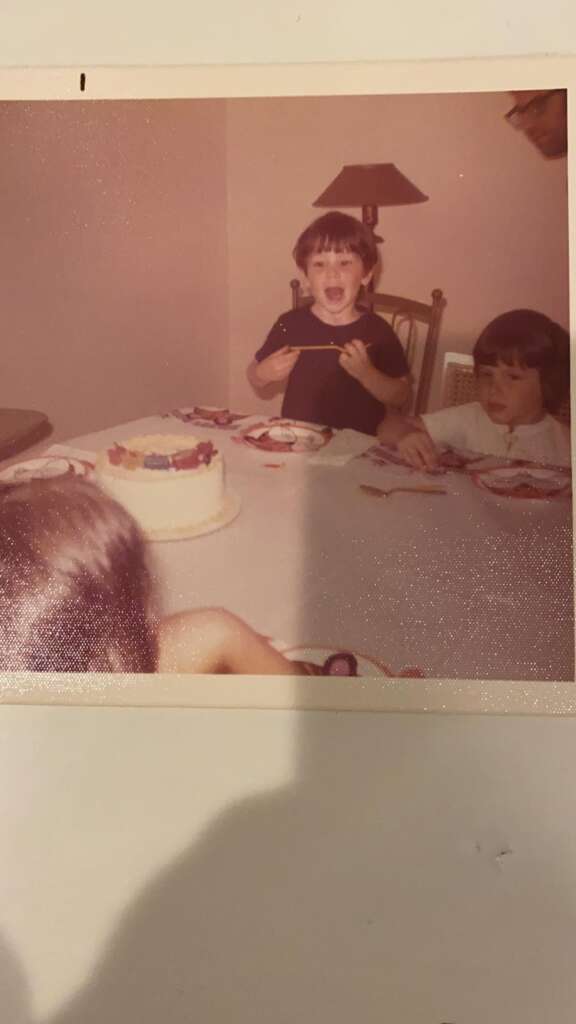
Our Jonathan was such a friend too. He was loyal, never sought (nor even enjoyed) the spotlight, and was always happy to cheer someone else on as they pursued and fulfilled their dreams. Some of my favorite images of him are of him watching others – especially his children. To see him watch his son Tyler playing hockey or his daughter Samantha singing or acting or playing basketball was to truly see someone glowing with pride. And as a good friend, he was always happy to do a favor for someone. The Piescezna Rebbe – who protected 1000’s of child orphans during the Holocaust – used to teach the same thing almost every Shabbat sermon: “Children, precious children, just remember the greatest thing in the world is to do somebody else a favor.” Jonathan did so many favors. When I was University in Washington, DC he too moved to the region at some point in time. We had great fun together – he would come down to play basketball with me and my friends, take us on outings and join in on adventures like paint-ball. He also took me out to meals and when he saw that I needed some new clothes he took me shopping. When me and my friends would travel, he would always get us a hotel room for either free or dirt cheap because of his hotel connections. And when I decided to become more observant, even though this was not his thing, he lent me his car a few times a week so I could travel to Baltimore to take classes. And from generation to generation … I was talking to Michaella, my daughter, and she told me the story about how she was once staying at his house in Anthem and Jonathan asked her what she wanted for dinner. She said pizza, which for most would have been an easy request, but because we are kosher, it meant that it was a far greater inconvenience as the only kosher place was about an hour away. Without hesitation, he jumped in the car with Michaella and drove her to the restaurant to have pizza. What’s a couple of hours in the car and traffic (for a task that normally would be a few minutes) when one of things you most love to do are favors for others. And while he was a good and loyal friend to me and many others, he took this value to a higher level altogether when it came to my parents. I marveled at how he fulfilled the mitzva (commandment) of honoring one’s parents. He took them into his house when my father was sick and attended to their every need and comfort. I remember my Dad had a particular chair that he liked to sit in, and Jonathan not only moved it into his house when my father moved in, he also moved it out of his house (and then back in) whenever my father would spend some time in a different location. After my father passed he took care of along with my siblings the moving of their home and then getting my mom set up in her new place. When my mom’s TV didn’t work (he would say operator error), she would of course call him. Even though he had just been at her place taking care of whatever she needed (including getting the TV to work) and had now arrived home, he nevertheless got back in the car and drove the 45 minutes yet again to her place to take care of it.
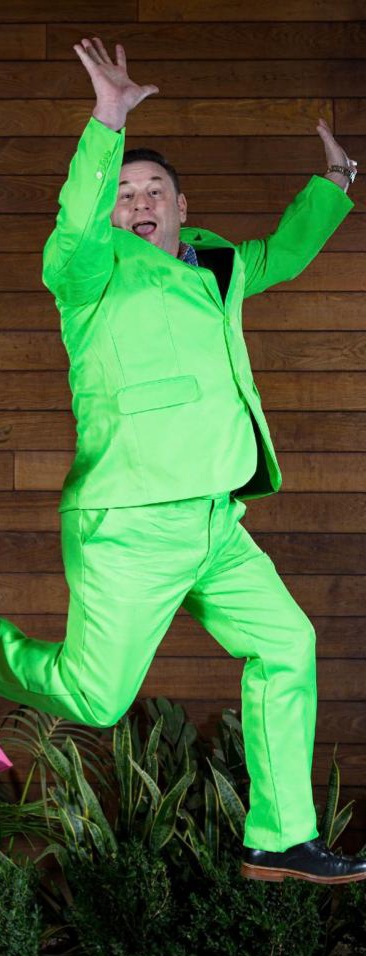
The second name my parents gave him was Aaron, which is the name of my mother’s mother’s family. Aaron of course is also a Biblical figure, the older brother of Moses (and the High Priest). When I first thought about this name, I thought perhaps my parents got it wrong this time. Don’t misunderstand me, I like the comparison; after all, it sets me up as Moses. But to truly know Jonathan is to know he did not share many of Aaron’s most famous qualities – especially those that describe Aaron as a man of peace who would go out of his way to bring people together and not hurt people’s feelings, even if this meant softening the truth – or even outright lying – about their flaws. Jonathan did not suffer fools nor foolish behavior. If someone was wrong, he would often point it out, or at the very least, he would offer his trademark: “Bless their soul.” This was not a genuine blessing; this was Jonathan saying the person was in serious need of help. The funny thing about him, though, is that even after he expressed his displeasure with someone or otherwise disapproved of their choice, he nevertheless would then proceed to go and help the person out. Talking with my sister, Sara, we agreed that the Israeli fruit sabra was a good analogy. It is prickly on outside, yet soft on the inside (maybe it’s not a coincidence that the English of Sabra is prickly pear). Jonathan might sigh in disbelief that a person didn’t know how to work a computer, or couldn’t change a flat or figure something else out by themselves, but then then he would go and do exactly what they needed to get done.
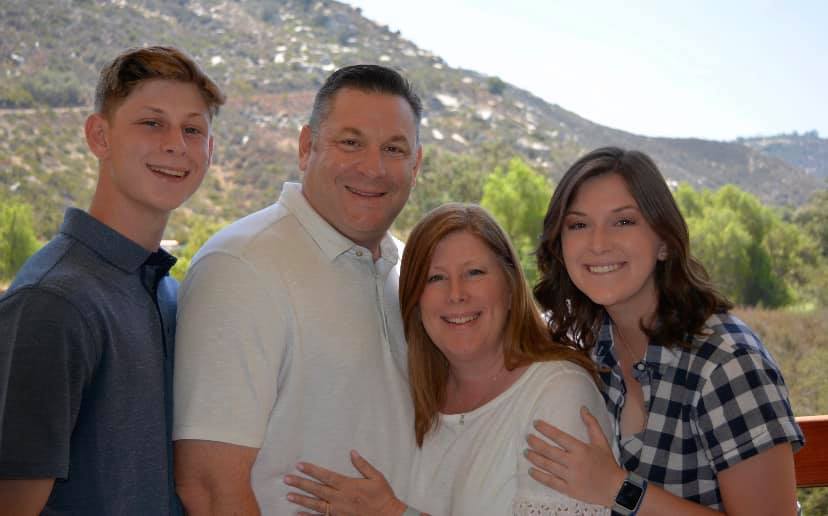
This realization led me to reconsider my feeling that ‘Aaron’ was not an accurate name. After all, the main reason why he was given that name was to recall and honor my mother’s family, the Aarons. They were incredibly hard working and industrious people. I remember often visiting my grandmother and the first thing she would ask me is if I was working. I would answer that I was still in high school and studying was my job, or in college, or in law school or Rabbinical school. She was never impressed. Jonathan on the other hand always had an answer she loved, as he was always working, even at a young age. He loved putting his nose to the ground and working. For him, it was both a character trait as well as a value; it was about not taking things for granted, about learning new skills, about being practical, being useful, being creative – as well as demonstrating commitment … to people, to things, to ideas. At our wedding, he toasted Rachel and I by saying that Love is not something you are in, but rather something that you do. And he was always doing. I’d like to end by suggesting the most accurate name my parents gave him is his Hebrew name, Yehuda, for which he was named to memorialize my mother’s grandfather on her father’s side, Julius (Yehuda) Krimsky. Yehuda in the Bible was not the oldest of Jacob’s 12 sons, but was the clear leader, and the line of Kingship comes from him. The main reason why he was selected relates back to how he acted vis-à-vis his youngest brother, Benjamin. The short version of the story is that Benjamin was thrown in prison in Egypt and all the other brothers were given permission to leave so long as they left him behind. Yehuda, however, had promised to be Benjamin’s guarantor and there was no way he was leaving him behind. And so he stepped forward and protested. The commentators say he was not only ready to argue with the most powerful person in the world at that time to ensure Benjamin’s protection, he was also prepared to take on the entire Egyptian army – by himself – if that was the only way to secure his release. That was Jonathan, too. He was my – and so many others – Yehuda. A protector, a guarantor. I’m sure this is something everyone close to Jonathan can relate to, but is especially true regarding his beloved Jamie, Samantha and Tyler. He was so ferocious in his love and protection of Jamie his wife, and so dedicated to his two children. Someone asked me what Jonathan did professionally and I said he was in real estate — and that he liked it and did well at it — but to me at least, it never really struck me as describing him too well. It was what he did. But who he was — that was family, being a husband and father. As his younger brother I also felt his protection as well. As I reflect back on our youth, image after image appears in which he was standing next to me and somehow protecting me. There he is walking with me to school (and back home afterwards). To baseball practice. To the JCC. He was also always getting me into the basketball game with older kids. At the time, I assumed I was invited to play with the older kids because of my natural talent. Given that I didn’t even make my Freshman basketball team at school, while Jonathan played Varsity basketball, my guess is that it was not my talents that secured the invite but rather Jonathan’s willingness to include me. Similarly with all those times I remember hanging out with his friends. I thought it was my natural charm and maturity, but again it’s more logical that Jonathan had arranged it. I remember on a different occasion when we went skiing – again always together despite the fact he was much better than me. We were on a slope that was above my level and Jonathan was helping me maneuver down the hill. Eventually I had to admit I just couldn’t do it and he told me it was OK just to sit on my rear end and shimmy down the hill like that. He helped me get down all the way, despite the long delay it required in watching over me (and time was of the essence when we skied, as we always tried to be the first ones out on the slopes and the last ones off in order to ski as much as possible). But he was not just willing to lose some precious time to make sure I arrived at the bottom safely. Midway down I let loose of my ski that I was holding in my hand as I shimmied down the hill. It went all the way down and became lost in the woods. Jonathan then wasted the rest of his day helping me search for that ski. … Another image of him as protector, this one about which I had apologized to him many times before. Jonathan was always stronger than me so if I wanted to exact revenge in our daily battles, I realized I would have to do it somewhat stealthily. In our home in Binghamton, I sat in our den while he was in the Kitchen, and there was a hallway between the two rooms with a door to the bathroom along the way. My plan was as follows. I would call Jonathan feigning some type of desperate need – “Help, I need you!” He would come walking down the hallway and I would pull the string I had attached to the bathroom door and it would open up and hit him on the backside as he walked past. It would hurt, but not too much. But I hadn’t planned on one flaw in my plan. When I yelled for help, Jonathan didn’t come walking to the room; he sprinted! And he was fast – like superfast. So my timing was totally off. Rather the door hitting slightly in the back, it smacked him right in the face and knocked him down. All because when he heard that I was in need, he didn’t hesitate. He didn’t come slowly. He raced to my aid. (So you can understand why I felt so guilty about this). That was Jonathan as Yehuda. A protector. A big brother. The one who watched over us younger kids. One last protector story. When over the past few months we discussed his illness, I told him I was sick over the situation, and we cried together on numerous occasions as a result. I told him it was so unfair that it is happening to him, to which he offered an amazing reply. First, despite all the suffering, despite the prognosis, and despite what he knew lay ahead, he told me that he felt he received from life far more than he really deserved. He said he felt lucky to have lived the life he had, even with the sickness. How could he say that I thought, but he did … and he meant it. It reminded me of the same grace and heroic attitude my Dad had as he faced his illness and ultimate death, and Jonathan agreed that he had learned it from our Dad. In time, I hope to learn such grace and positive attitude and gratitude from Jonathan. Second, Jonathan said he was actually happy that all this was happening to him and not anyone else, certainly not any of his siblings or family, and if given the choice to have it happen to him again or God forbid it strike someone else, he would without hesitation take it again. That’s who he was – a big brother to the very end. If there was something difficult to do, someone who needed to go first, someone who had to summon up the courage to take on a great challenge, he wanted to do it and not have anyone else suffer. He entered the world as Yehuda and exited at as Yehuda.
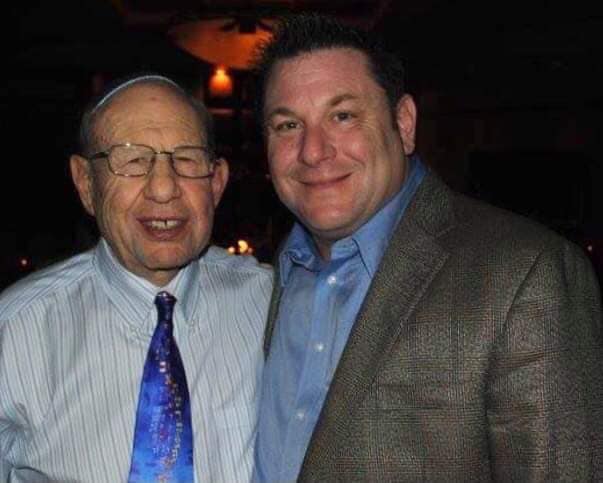
Because of the timing of his passing and me not being able to be there due to the closure in Israel and Covid in general, I actually started sitting shiva a few days before the funeral itself. This allowed me to share many stories about Jonathan with those who visited me over Zoom calls. When I told some of the stories about Jonathan, about the person who he was and the things he accomplished, one Orthodox Rabbi on Zoom said it sounded like he had arichut yamim, an expression in Hebrew that means long days, a euphemism for long life. But this was not true. Jonathan was only 52. This is so unbelievably too painfully short. Just as I was in disbelief when he was first diagnosed with such a rare cancer, I remain in disbelief about his passing. He had so much more to give and be. But the Rabbi offered a different understanding of the expression: Jonathan did not have long days in the sense of long life, but he did have long days in that every day of his life was long in itself … each day was filled. In his short time, Jonathan accomplished more than most, gave to more than most … and thus had long days, with each day longer than most. Knowing who Jonathan is, I hope the fact that Orthodox Rabbis in Jerusalem are discussing the lessons they can learn from him gives him one additional smile as we leave him today. I know that he will never leave me.

